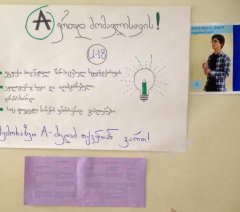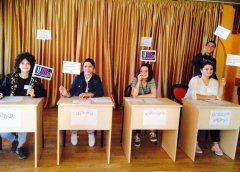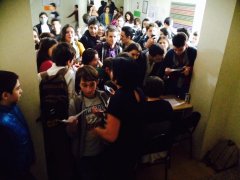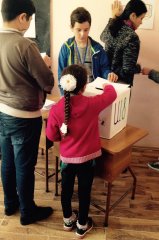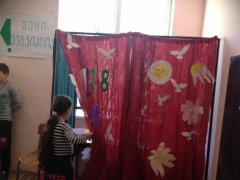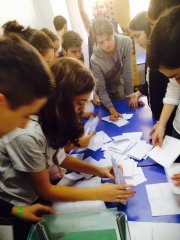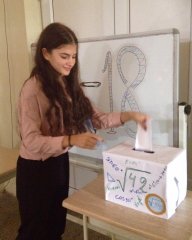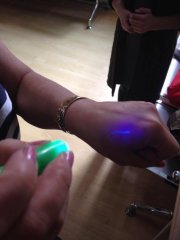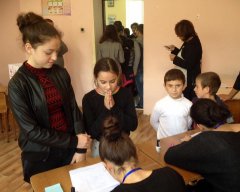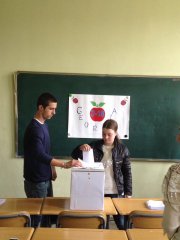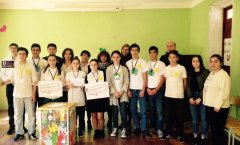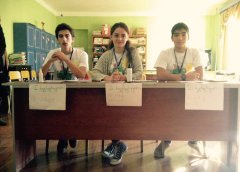U18 election in the frame of the project “We can more” was provided in 10 regions of Georgia (among 11 regions in general) – almost the whole country was covered. The U18 election was provided the second time in 6 regions: Tbilisi, Kvemo Kartli, Shida Kartli, Imereti, Samegrelo, Ajara.. in 4 regions U18 election was provided the first time. Those regions are: Kakheti, Guria, Samtskhe-Javakheti and Mtskheta-Tianeti.
The Ministry of Science and Education of Georgia was informed about the project ”We can more” and Youth Election: there was organized several meeting with the representatives of the Ministry, they’ve attended the workshop for the multipliers about the methodology of U18 election, at the same time the ministry was systematically updated with the news about the project. The ministry of Education had supported the project – sending to every schools the official letter, informing them about the project involvement possibilities. Without this support and collaboration it would be much complicate to involve schools and civic education teachers in the project.
In each regions regional coordinators were working directly to their target schools and teachers of civic education. 75 public and private schools implemented the U18 election connected with local authority election in Georgia.
The programs of candidates (parties) was presented to students: the candidates were titled as “election subject A, B, C etc”, so that the candidates stayed anonymous for youth and the main accent was focused on the content of the programs of “election subject “ (students were less influenced by the name and personality of the candidates)… the programs were published on the blog of the project – open source and available to everyone, http://u18georgia.blogspot.com/
In the beginning of October at the lessons of civic education (or after the school lessons – in the youth civic clubs) the teachers were discussing the programs of candidates. As the project was implemented in 75 schools (with different background in civic awareness) teachers were free to choose the methods for presenting the programs of candidates.. here is some techniques teachers used:
- Students were discussing about their priority topics the programs – what is the most important for the local community (infrastructure, social or educational programs, social support, environment, safety etc)
- Students were divided in groups, each of them were given the program of one candidate. Students made presentations of candidates, focusing on the strong sides of the programs..
- There were organized the debates between the candidates – arguing the strong and weak sides of the programs
- Students made some pre-election promotion in the schools, promoting their candidates, organizing “meetings with electorate”, posters, slogans etc..
At 9-18 October the local U18 elections were provided. For the election students prepared creative election cabins and voting boxes, some schools had borrowed the real voting boxes and uniforms for the election commission, to give students sense of the real election.
The bulletins and other documents for U19 election also was published on the blog of the projects, Regional coordinators had downloaded and printed for the local schools.
The U 18 election was provided differently in the schools:
- Elections were provided during the break in between the lessons at the schools. The election points were organized in the central holly of the schools, every students could vote.. the programs of the candidates were presented on the walls near the election points,
- Election was organized after the school lessons, election point was in one of the class room.. Every student, interested in the election could vote..
- Election was provided during the lesson of Civic Education, participation in the election was optional – not mandatory for students…
- Election was provided out of the school – in local youth centers..
Totally over 7000 students voted in U18 election. The highest number of participants were in Tbilisi and Adjara regions. Despite the fact that In Tbilisi only 5 schools were involved in the project, number of participants was high ‘due the fact that in Tbilisi the “Big” schools took part, with the high number of students (over 1000 pupils in each). In Adjara – U18 was implemented in 30 schools.
The gender balance among participates was almost equal – 52% girls vs 48% boys. Tis balance was a little different in various regions (see the statistic below).

10% of the voters were students of primary schools, for them the program of candidates were a little simplified by teachers, students get the first experience of the election.
40% of participants were student aged 10-15 years
The main part of participants – 50% were students of high schools, aged 15-17, who already are studying the subject “civic Education” at schools and have higher civic awareness.

The final result (according to parties) of U18 elections was a little different from the general results of local election in the country. The leading party – “European Georgia” was the second one. and the new party “For European Georgia” was the first. (it happened opposite in the real election) till the end of the election the candidates stayed anonymous for students and just after the voting the election candidates were “revealed”..
The results of four leading parties in U 18 election:

1 – National Movement; 2 – Georgian Dream; 3 – European Georgia; 4 – Unity – New Georgia
For the project “you can more” there was created the public page on FB. https://www.facebook.com/U18Georgia/ participants were sharing the photos of their activities .. for the working group – coordinators and multipliers the closed group was created on social media. Where they’ve shared their experience in the project implementation, working with students, their challenges and problem solution.
All the teachers and active students were awarded with special diplomas for active participation in the project “We can more”…
|
N |
Region |
Number of Participants | ||||||||||
|---|---|---|---|---|---|---|---|---|---|---|---|---|
|
total |
Schools |
Girls |
Boys |
Age 6-9 |
Age 10-13 |
Age 14-17 |
Subject A |
Subject B |
Subject C |
Subject D | ||
|
1 |
Imereti |
835 |
9 |
424 |
407 |
11 |
267 |
558 |
147 |
232 |
361 |
106 |
|
2 |
Mtskheta-Tianeti |
507 |
4 |
218 |
276 |
76 |
212 |
206 |
89 |
92 |
182 |
112 |
|
3 |
Tbilisi |
1375 |
5 |
768 |
589 |
223 |
632 |
520 |
424 |
334 |
428 |
149 |
|
4 |
Kvemo Kartli |
807 |
8 |
405 |
402 |
62 |
401 |
334 |
178 |
272 |
255 |
70 |
|
5 |
Guria |
269 |
4 |
138 |
129 |
10 |
90 |
162 |
61 |
85 |
73 |
50 |
|
6 |
Kakheti |
193 |
3 |
73 |
63 |
0 |
81 |
55 |
28 |
55 |
36 |
20 |
|
7 |
Samegrelo |
464 |
4 |
247 |
157 |
90 |
234 |
90 |
115 |
87 |
186 |
76 |
|
8 |
Shida Kartli |
229 |
4 |
114 |
115 |
0 |
71 |
149 |
27 |
33 |
123 |
26 |
|
9 |
Adjara |
1995 |
30 |
975 |
955 |
184 |
627 |
118 |
490 |
588 |
469 |
307 |
|
10 |
Samtskhe-Javakheti |
371 |
4 |
200 |
171 |
30 |
162 |
178 |
123 |
154 |
64 |
29 |
|
Total |
7005 |
75 |
3562 |
3264 |
686 |
2777 |
3370 |
1682 |
1932 |
2177 |
945 |
|
At 15-th of December 2017 in Tbilisi was organized conference about the youth election in Georgia, Coordinators from every regions, teachers and students had shared their experience in Youth election, presented some success stories and new approaches in the implementation of youth election. The representatives of the German Embassy, Ministry of Science and Education of Georgia, youth workers from NGO were attending the conference.
U18 - ახალგაზრდული არჩევნები საქართველოში
U18 Elections
22366804.jpg
22310337.jpg
22310444.jpg
22365547.jpg
22366611.jpg
22406291.jpg
22406473.jpg
22448509.jpg
22448629.jpg
22449605.jpg
22449944.jpg
22490166.jpg



